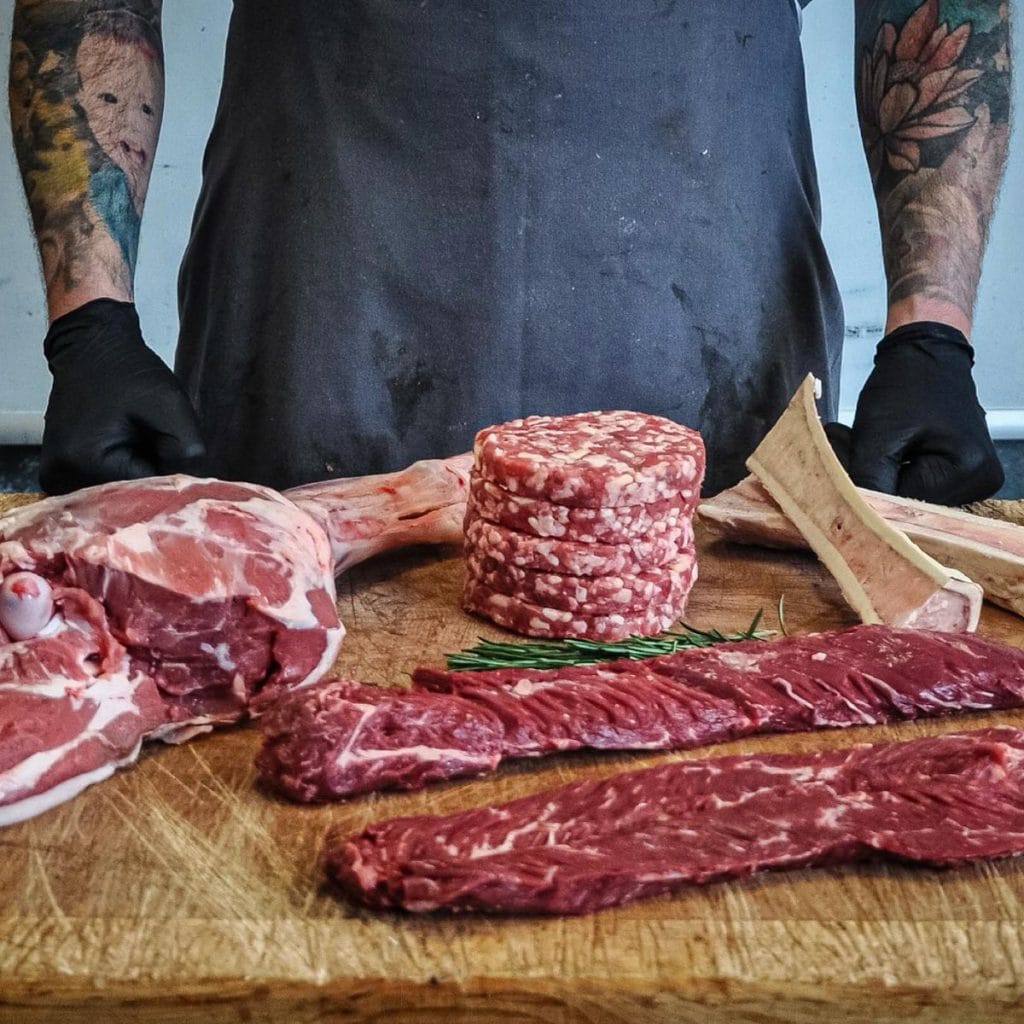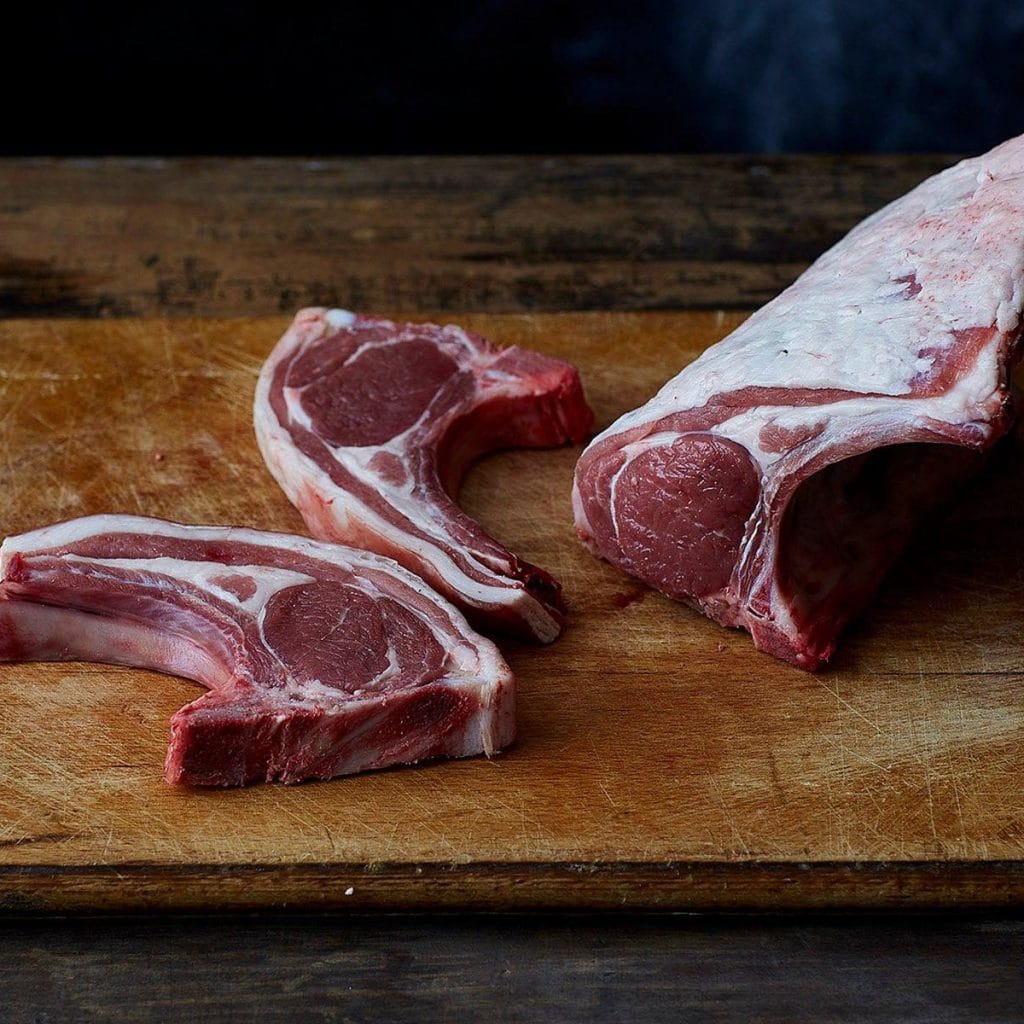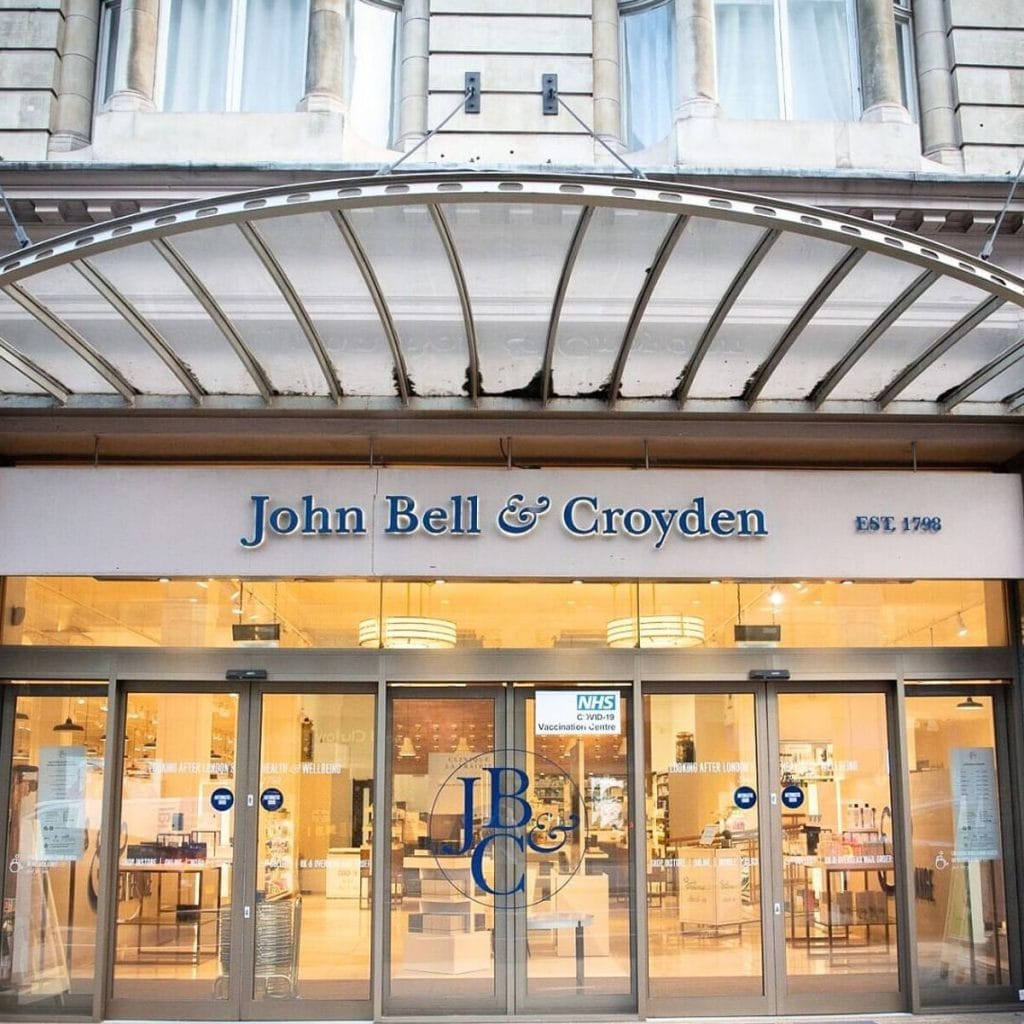Early on Saturday, Moxon Street feels half asleep. The baker’s delivery van hums away, La Fromagerie props open a timber door, and a low murmur swells outside a forest-green shopfront. The line is friendly but focused. Shoppers balance tote bags, swapping recipes for slow-roast pork while peering through large panes of glass. Inside, gilded pies cool on wire racks, crimson ribs hang beside chalked labels, and a tray of Ginger Pig sausage rolls disappears as fast as it arrives.
This scene repeats daily and explains why locals call the address the best butcher in Marylebone. The shop is not simply a counter; it is a theatre of craft where provenance, flavour and old-fashioned service rule. Set against a neighbourhood famed for specialist food stores, the butcher has become a landmark as recognisable as Daunt Books on the High Street.
From Antiques to Livestock
Founder Tim Wilson never intended to swap mahogany sideboards for Tamworth pigs. He bought a neglected medieval farmhouse near Northallerton in the 1990s, installed three Saddlebacks to liven the yard and soon faced a surplus of pork. Keen to avoid waste, he learned sausage-making from a Liverpool butcher who owed him money. The ginger-tinted bristles of his favourite breed inspired the business name, and the gamble paid off when he took a modest stall to one of Henrietta Green’s early food fairs at Borough Market in 1998. Three days’ stock sold out in hours.
Encouraged, Wilson searched for a permanent London base. The leap north of the river was bold. Early Moxon Street customers eyed the artisan butchers’ London newcomer with caution, yet superior flavour silenced doubts. Twenty-five years on, the shop remains the beating heart of a company that runs seven outlets, a cookery school and 3,000 acres of pasture across North Yorkshire.
Why Provenance Tastes Better
The butcher’s motto is blunt: “Animals looked after in the field taste better on the plate.” All livestock comes either from Wilson’s own farms or from trusted friends who share that belief.
- Cattle graze rough pasture, grow slowly and develop generous marbling.
- Tamworth and Saddleback pigs live outside in family groups, rooting through straw and woodland.
- Native sheep breeds such as Swaledale thrive on heather moorland and grass, gaining depth of flavour rather than sheer weight.
Low-stress transport and calm slaughter complete the welfare chain. The result is meat with a clean finish and mineral richness that supermarket lines cannot match.
Hanging Beef the Old Way
Behind the Marylebone counter stands a walk-in chamber chilled to 2 °C with steady airflow. Whole sides of beef hang for at least 28 days. During that time, enzymes break down muscle fibres while moisture evaporates, concentrating flavour. The butcher loses weight – and therefore cash – yet earns praise for steak that sears to a mahogany crust and slices like butter. Rib-eye and sirloin remain favourites, but regulars swear by the cheaper hanger steak for weekday suppers.
The Sausage Roll That Built a Following
New visitors should order two items. First, the legendary sausage roll, weighing almost half a kilo. Seasoned Tamworth pork, sage, white pepper and a whisper of mace sit inside flaky pastry with a crackle that echoes off tiled walls. At seven pounds, it replaces lunch, satisfies late-night cravings and travels well on the train home. Second, choose a pie. Recipes vary – steak and ale, chicken and mushroom, traditional pork with quivering jelly – yet each honour the nose-to-tail principle that birthed the business. Thick suet lids or hot-water crusts may feel dense to modern palates, but they protect generous fillings and keep waste close to zero.
Fun Fact: Each year the Marylebone branch sells around 190,000 sausage rolls – enough to stretch from Moxon Street to York Minster if laid end to end.
Beyond the Counter – Classes After Dark
When the door bolts at six, fluorescent lamps click on and butcher’s blocks roll forward. Evenings here belong to students keen to break down a lamb shoulder, twist perfect sausages or tackle barbecue cuts. Groups share a roast beef supper at long communal tables, then leave with knives wrapped in greaseproof paper and a bag of meat that inspires next weekend’s feast. The programme turns customers into ambassadors, passing knowledge through households and Instagram alike.
A Retail Experience Built on People
Walk in at midday, and you will hear names exchanged with familiar warmth: Sam from W1 returns for skirt steak; Amina needs advice on slow-cooking shin; a couple debating Sunday lunch is offered a taste of hot lamb pie straight from the rack. Staff note favourite cuts, remember holiday stories and suggest cheaper alternatives without upselling. This culture fosters loyalty that surpasses any reward card. One regular admits she and her partner moved back from Milan partly to regain easy access to Ginger Pig pork chops.
Awards and the Chef Seal of Approval
Industry accolades provide useful headlines, yet peer endorsement carries greater weight. Top kitchens, including Hawksmoor, Dishoom and Honest Burgers, buy prime cuts here, citing consistency and ethical sourcing. The Observer Food Monthly crowned the business Best Food Producer, acknowledging its role in reviving British butchery at a point when independent shops were closing weekly.


Driving the London Butcher Revival
During the supermarket boom of the 1990s, thousands of traditional counters shuttered. Ginger Pig swam against that tide by reminding customers why fat equals flavour, why slow-grown livestock delivers better nutrition and how secondary cuts can taste superior when cooked correctly. Demonstrations, recipe sheets, and social media posts demystified offal and encouraged value shopping. Competitors took note, and a new generation of artisan butchers in London emerged, echoing similar principles in Peckham, Stoke Newington and Tooting.
Sustainability and Profit in the Same Basket
The pies, terrines and stocks so adored by customers existed first to solve a waste problem. Wilson’s rule – nothing disposable within an animal – reduces margins on raw cuts but adds lucrative deli revenue. Sausage meat absorbs trim, bones become broth, and pastry lids protect shelf life. Environmental logic aligns with balance-sheet health, proving large-scale impact can start on a small chopping board.
Inside the Moxon Street Triangle
A five-minute stroll forms Marylebone’s tastiest triangle. Start at The Ginger Pig Marylebone for smoked ham, cross to La Fromagerie for raw-milk cheese, then pick a Burgundy from Le Vieux Comptoir. The cluster attracts chefs, food writers and tourists who might otherwise focus on Borough Market. Café culture spills onto pavements, and the High Street benefits from footfall that values niche retail over homogenised chains.
Practical Visitor Guide
- Address: 8-10 Moxon Street W1U 4EW, two minutes north of Marylebone High Street.
- Opening hours: 09:00-18:00 Monday to Saturday; 10:00-16:00 Sunday.
- Arrive before 12:30 for hot Ginger Pig sausage rolls – they often sell out by 14:00.
- Butchery classes run from Tuesday to Friday evenings. Book online six weeks ahead.
- Ask for dry-aged beef that is at least 35 days old if you’re cooking steak for a special occasion.
Customer Stories That Show Impact
Isaac Joseph calls every Thursday for bavette. Staff enquire about his new baby, hand him bone marrow for stock and slip an extra slice of roast ham into the bag. Marta and Riccardo commute from Richmond each month, filling a cool-box with Ginger Pig meat quality pork chops and Swaledale mutton. They claim the taste anchors family life more powerfully than any Italian import they can find in London. Such anecdotes read like folklore, yet repeat daily.
The Future of the Brand
Expansion remains cautious. New sites open only where Wilson can guarantee the same field-to-shop supply chain. Plans include investing in on-farm renewable energy to cut refrigeration costs and exploring British grain-fed beef as climate shifts influence pasture growth. Core principles remain fixed: native breeds, slow growth, whole-carcass use, and staff trained through rigorous apprenticeships.
Why It Matters
In an age of convenience, The Ginger Pig proves that patient craft and transparent ethics still resonate. The shop supports family farms, trains urban cooks and keeps money within local economies. London gains a richer food culture; diners gain deeper flavour. As the saying goes, “Look after the pennies and the pounds look after themselves” – a reminder that caring for small details, from animal welfare to friendly counter chat, builds a business that lasts.



